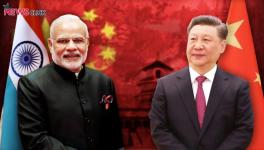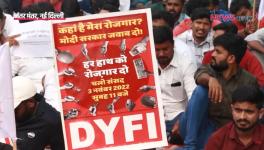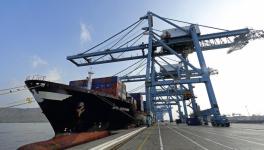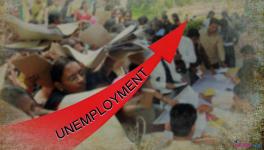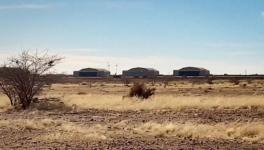Occupy Wall Street -- The Challenges Ahead
The Occupy Wall Street has changed the discourse in the US, bringing out the exclusions of 99% of the people and the total inequality that now prevails. It has brought in different kinds of movements and created a huge oppositional space. The challenge in the days ahead is how to bring together all these elements in a coherent way without losing the vitality of the movement.
Rough Transcript
Prabir Purkayastha (PP): Hello and welcome to Newsclick. Today, we have with us Prof. Vijay Prashad from Trinity College, Connecticut. Vijay we have been all observing the occupy wall street campaign going on in the United States, spilled over in cities and even different countries. What do you think is bringing people out in such a large numbers and do you think it really crossed what I would call as the insensitivity barrier seem to have been there long time in United States.
Vijay Prashad (VP): Well look there are so many problems and so many grievances among the populations that it is no surprise that something like this has happened. The immediate approximate cause for bringing people out is simply the very miserable economic conditions in the United States with an official unemployment rate that refuses to go below 9.1%. in some cities like Hartford the official unemployment rate is 33,5%. So one in three person in Harford, Connecticut where I am now are unemployed. Put to that, on top of that, the political situation is miserable. Neither the Republicans nor the Democrats can come up with any kind of credible policies which seem to be able to address this stark economic problem, joblessness, high income inequality and at the same time banks and CEOs who seems to be making considerable profit as the year goes on. So there is the economic condition, there is the political crisis and in the middle of this when the call was given for occupy wall street, many people came just on first day. There are so many grievances and I think it just took the trigger over the political collapse where there was a stalemate in Washington to provide the impetus to the people to stick it out now and way to see what the next period will bring.
PP: Do you think that the emergence of a kind of left block in American politics? Earlier we had a tea party which is really trying to shift the politics of the Republican Party at least to the right. Do you think this in some sense a kind of left pressure group which is going to be created?
VP: You know for the past several decades people have moved into a single issue organizing. So there have been a reasonable size movement in cities against police brutality, against homelessness, against the war, there have been movements against the student debt. All across the political landscape there has been a fragmented left which is not been able to find any way to coalesce. When occupy wall street began, these many fraction of left have become an essential party to occupy wall street. Which is why the grievances being articulated at this occupy sites are many and why there are no simple demand sheets. Every important grievance is finding an airing. So certainly the left not coming of no where but coming out of fragmented state has found something to unify around which is the symbol of we are the 99%. What's also important is that we are the 99% are not clear about whether the legislature agenda is at all possible. Whether they should become a left block for as it were the democratic party. Most of the occupy sites I have visited there is a great sense that the political system is completely broken and an alternative is necessary. So they are not willing as if to break up their tents and going work of Barack Obama's job or go in work for the reelection campaign of Barrack Obama. Many of these people at these occupy sites are greatly dissatisfied with the entire political system. So yes, a left block has coalesced. But whether this left block will have electoral impact or not that is to be seen.
PP: The issue that has come up is that fact that there is no common set of demands. Do you think this is a weakness or a strength of this kind of coalescence?
VP: We are the 99%, we are the 99% of the population. We have very little access to property, very little access to power. Nobody is listening to us. The lobbies in Congress are the lobbies of 1%. currently in the private sector, the unions are 7% in the workforce of private sector unionized. So there is the great sense, the first principle demand that we need our voice hear. We want to have a place in the political dialogue. So I think there is a demand. The demand is very general. Each occupied site has produced it's own sets of demands and there are many and why I think it's actually not a problem at this stage to have a very complicated set of demands is that the occupied movement is coalescing a left block. At this time all grievances need to come and find a place at the block. This is not the time for sectarianism. This is not the time to narrow the demands greatly to cut people out. We are coming out of a period where left was deeply fragmented as I said into single issue politics. It's going to take some time for those single issues to be brought on to the table and for a kind of overarching framework to be created. I think that idea of the 99% is very elegant opening demands which enables this wide sections of grievances to be aired and for a wide section of people to see themselves in this movement. People who had actually no allegiance to any kind of left or progressive politics and people who will has been ardent activists in left and progressive movements, they are all finding themselves inside the 99%. So yes, it's a very great thing that they have not tried to streamline the movement immediately. Certainly, the question of streamlining will come. But let it come in time.
PP: You know there are two ways for this movement to develop to really look at it. One is to get into the common minimum demand, have a demand charter, a kind of organised expression of what is happening. The other is to continue to keep this as a kind of open dissident space in which all the oppositions in that sense is expressed together. How do you see the immediate term and long term t this is development?
VP: Firstly, in the very short term there are some practical problems which is that police in cities like Atlanta and Oakland have taken a heavy handed approach to the occupy movement. In Oakland the police has used the tear gas, rubber bullets and dispersed the crowds. So there is going to be the short term problem of the police and of the weather. In New England, the snow is going to fall. It is not clear that people had to withstand the very cold temperature in terrible conditions. So it's my sense that in the short term what would be really appropriate is for the occupied movement to declare victory, a considerable victory already and to say that whether we stand in encampment is not the issue. The issue is not to protect the encampment. The issue is to protect the momentum. Certainly, they should say we are going to return in April. In April when the weather is better. April 15 is the tax day. That would be a nice symbolic day to return. My sense is the encampment themselves are not the issue. The issue is the momentum. That means that if the issue is the momentum, I think both approaches which you have sketched out are important. In other words, both you know dissidence space must be maintained. The open space for growing out of a nursery a left block in the United States. Left block in the United States has been crushed. So this is in a sense nursery gardening. We are starting from small shoots. So an open dissident space must be maintained at the same time because there is a kind of structurelessness or enforced structurelessness in the movement there are no easy leaders but still, at the same time just as the movement declares victory. You know the victory is simple. Everybody is talking about income inequality in the United States. Everybody is talking about the fact that there is such high joblessness. This is entirely a consequence of the occupy movement. The fact that this tax day last year the average tax cut taken by the one person was equal to the average income of the 99%. we are at such an incredible state of inequality in the United States. Everybody is now talking about. There is sufficient to declare victory on that itself. I think the open space must be maintained because that is crucial in this period to actually building the movement.
PP: So basically, it has shifted the discourse but how can it shift the politics is something that needs to be seen. This is basically your take on this occupy wall street currently.
VP: Yes, precisely. I mean it has a lot to do with the fact that political, that is to say the electoral space in United States is suffocatingly closed. It is impossible really for the left to produce any kind of immediate impact upon the democratic party. You know what is perhaps necessary is for some kind of independent space to the left of the democratic party to open. But in this kind of political system, a third party is virtually impossible. So it's going to be very curious developments in the next few years as this left block independent of the democratic party tries to engineer a space for itself in the electoral domain which it doesn't automatically have. So right now there is a left politics developing but a left electoral space that is to be seen.
PP: But it will help still it has helped to shift the discourse. It may also help to shift the politics of United States. It may also help to shift the politics of the United States more towards the centre certainly not to the left as of now. So I think now lets watch how it develops and we will come back to you again. Thanks Vijay.
VP: Thank you.
Get the latest reports & analysis with people's perspective on Protests, movements & deep analytical videos, discussions of the current affairs in your Telegram app. Subscribe to NewsClick's Telegram channel & get Real-Time updates on stories, as they get published on our website.











